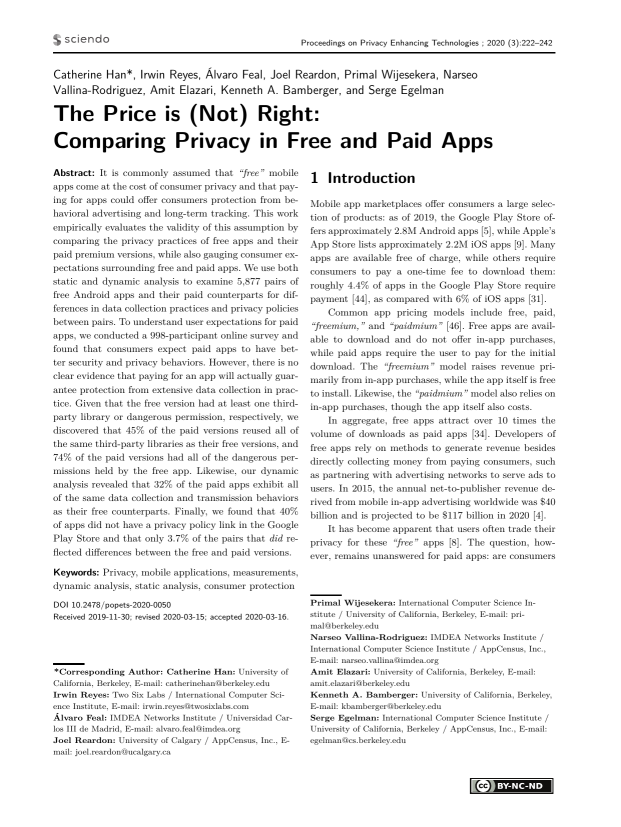The Price is (Not) Right: Comparing Privacy in Free and Paid Apps
Authors: Catherine Han (University of California, Berkeley), Irwin Reyes (Two Six Labs / International Computer Science Institute), Álvaro Feal (IMDEA Networks Institute / Universidad Carlos III de Madrid), Joel Reardon (University of Calgary / AppCensus, Inc.), Primal Wijesekera (International Computer Science Institute / University of California, Berkeley), Narseo Vallina-Rodriguez (IMDEA Networks Institute / International Computer Science Institute / AppCensus, Inc.), Amit Elazari (University of California, Berkeley), Kenneth A. Bamberger (University of California, Berkeley), Serge Egelman (International Computer Science Institute / University of California, Berkeley / AppCensus, Inc.)
Volume: 2020
Issue: 3
Pages: 222–242
DOI: https://doi.org/10.2478/popets-2020-0050
Abstract: It is commonly assumed that “free” mobile apps come at the cost of consumer privacy and that paying for apps could offer consumers protection from behavioral advertising and long-term tracking. This work empirically evaluates the validity of this assumption by comparing the privacy practices of free apps and their paid premium versions, while also gauging consumer expectations surrounding free and paid apps. We use both static and dynamic analysis to examine 5,877 pairs of free Android apps and their paid counterparts for differences in data collection practices and privacy policies between pairs. To understand user expectations for paid apps, we conducted a 998-participant online survey and found that consumers expect paid apps to have better security and privacy behaviors. However, there is no clear evidence that paying for an app will actually guarantee protection from extensive data collection in practice. Given that the free version had at least one thirdparty library or dangerous permission, respectively, we discovered that 45% of the paid versions reused all of the same third-party libraries as their free versions, and 74% of the paid versions had all of the dangerous permissions held by the free app. Likewise, our dynamic analysis revealed that 32% of the paid apps exhibit all of the same data collection and transmission behaviors as their free counterparts. Finally, we found that 40% of apps did not have a privacy policy link in the Google Play Store and that only 3.7% of the pairs that did reflected differences between the free and paid versions.
Keywords: Privacy, mobile applications, measurements, dynamic analysis, static analysis, consumer protection
Copyright in PoPETs articles are held by their authors. This article is published under a Creative Commons Attribution-NonCommercial-NoDerivs 3.0 license.

